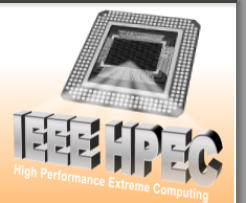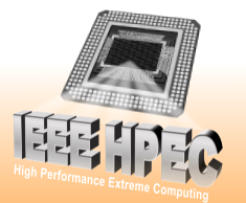
2019 IEEE High Performance
Extreme Computing Conference
(HPEC ‘19)
Twenty-third Annual HPEC Conference
24 - 26 September 2019
Westin Hotel, Waltham, MA USA


Thursday, September 26, 2019
Quantum
3:00-4:40 in Eden Vale C3
Chair: Patrick Dreher / NCSU
[Best Paper Finalist] C to D-Wave: A High-level C Compilation Framework for Quantum Annealers
A quantum annealer solves optimization problems by exploiting quantum effects. Problems are represented as Hamiltonian functions that define an
energy landscape. The quantum-annealing hardware relaxes to a solution corresponding to the ground state of the energy landscape. Expressing
arbitrary programming problems in terms of real-valued Hamiltonian-function coefficients is unintuitive and challenging. This paper addresses the
difficulty of programming quantum annealers by presenting a compilation framework that compiles a subset of C code to a quantum machine
instruction (QMI) to be executed on a quantum annealer. Our work is based on a modular software stack that facilitates programming D-Wave
quantum annealers by successively lowering code from C to Verilog to a symbolic "quantum macro assembly language'' and finally to a device-
specific Hamiltonian function. We demonstrate the capabilities of our software stack on a set of problems written in C and executed on a D-Wave
2000Q quantum annealer.
QxSQA: GPGPU-Accelerated Simulated Quantum Annealer within a Non-Linear Optimization and Boltzmann Sampling Framework
We introduce QxSQA, a GPGPU-Accelerated Simulated Quantum Annealer based on Path-Integral Monte Carlo (PIMC). QxSQA is tuned for
finding low-energy solutions to integer, non-linear optimization problems of up to 2^14 (16384) binary variables with quadratic interactions on a
single GPU instance. Experimental results demonstrate QxSQA can solve Maximum Clique test problems of 8100 binary variables with planted
solutions in under one minute, with linear scaling against key optimization parameters on other large-scale problems. Through the PIMC
formulation, QxSQA also functions as an accurate sampler of Boltzmann distributions for machine learning applications. Experimental
characterization of Boltzmann sampling results for a reinforcement learning problem showed good convergence performance at useful scales. Our
implementation integrates as a solver within our QxBranch developer platform, positioning developers to efficiently develop applications using
QxSQA, and then test the same application code on a quantum annealer or universal quantum computer hardware platform such as those from D-
Wave Systems, IBM, or Rigetti Computing.
[Best Student Paper Finalist] Multistart Methods for Quantum Approximate Optimization
Hybrid quantum-classical algorithms such as the quantum approximate optimization algorithm (QAOA) are considered one of the most promising
approaches for leveraging near-term quantum computers for practical applications. Such algorithms are often implemented in a variational form,
combining classical optimization methods with a quantum machine to find parameters that maximize performance. The quality of the QAOA
solution depends heavily on quality of the parameters produced by the classical optimizer. Moreover, the presence of multiple local optima makes it
difficult for the classical optimizer to identify high-quality parameters. In this paper we study the use of a multistart optimization approach within
QAOA to improve the performance of quantum machines on important graph clustering problems. We also demonstrate that reusing the optimal
parameters from similar problems can improve the performance of classical optimization methods, expanding on similar results for MAXCUT.
Message Scheduling for Performant, Many-Core Belief Propagation
Belief Propagation (BP) is a message-passing algorithm for approximate inference over Probabilistic Graphical Models (PGMs), finding many
applications such as computer vision, error-correcting codes, and protein-folding. While general, the convergence and speed of the algorithm has
limited its practical use on difficult inference problems. As an algorithm that is highly amenable to parallelization, many-core Graphical Processing
Units (GPUs) could significantly improve BP performance. Improving BP through many-core systems is non-trivial: the scheduling of messages in
the algorithm strongly affects performance. We present a study of message scheduling for BP on GPUs. We demonstrate that BP exhibits a
tradeoff between speed and convergence based on parallelism and show that existing message schedulings are not able to utilize this tradeoff. To
this end, we present a novel randomized message scheduling approach, Randomized BP (RnBP), which outperforms existing methods on the
GPU.
Prototype Container-Based Platform for Extreme Quantum Computing Algorithm Development
Recent advances in the development of the first generation of quantum computing devices have provided researchers with computational platforms
to explore new ideas and reformulate conventional computational codes suitable for a quantum computer. Developers can now implement these
reformulations on both quantum simulators and hardware platforms through a cloud computing software environment. For example, the IBM Q
Experience provides the direct access to their quantum simulators and quantum computing hardware platforms. However these current access
options may not be an optimal environment for developers needing to download and modify the source codes and libraries. This paper focuses on
the construction of a Docker container environment with Qiskit source codes and libraries running on a local cloud computing system that can
directly access the IBM Q Experience. This prototype container based system allows single user and small project groups to do rapid prototype
development, testing and implementation of extreme capability algorithms with more agility and flexibility than can be provided through the IBM Q
Experience website. This prototype environment also provides an excellent teaching environment for labs and project assignments within graduate
courses in cloud computing and quantum computing. The paper also discusses computer security challenges for expanding this prototype
container system to larger groups of quantum computing researchers.



Thursday, September 26, 2019
Quantum
3:00-4:40 in Eden Vale C3
Chair: Patrick Dreher / NCSU
[Best Paper Finalist] C to D-Wave: A High-level C Compilation
Framework for Quantum Annealers
A quantum annealer solves optimization problems by exploiting
quantum effects. Problems are represented as Hamiltonian functions
that define an energy landscape. The quantum-annealing hardware
relaxes to a solution corresponding to the ground state of the energy
landscape. Expressing arbitrary programming problems in terms of
real-valued Hamiltonian-function coefficients is unintuitive and
challenging. This paper addresses the difficulty of programming
quantum annealers by presenting a compilation framework that
compiles a subset of C code to a quantum machine instruction (QMI)
to be executed on a quantum annealer. Our work is based on a
modular software stack that facilitates programming D-Wave
quantum annealers by successively lowering code from C to Verilog
to a symbolic "quantum macro assembly language'' and finally to a
device-specific Hamiltonian function. We demonstrate the
capabilities of our software stack on a set of problems written in C
and executed on a D-Wave 2000Q quantum annealer.
QxSQA: GPGPU-Accelerated Simulated Quantum Annealer
within a Non-Linear Optimization and Boltzmann Sampling
Framework
We introduce QxSQA, a GPGPU-Accelerated Simulated Quantum
Annealer based on Path-Integral Monte Carlo (PIMC). QxSQA is
tuned for finding low-energy solutions to integer, non-linear
optimization problems of up to 2^14 (16384) binary variables with
quadratic interactions on a single GPU instance. Experimental
results demonstrate QxSQA can solve Maximum Clique test
problems of 8100 binary variables with planted solutions in under
one minute, with linear scaling against key optimization parameters
on other large-scale problems. Through the PIMC formulation,
QxSQA also functions as an accurate sampler of Boltzmann
distributions for machine learning applications. Experimental
characterization of Boltzmann sampling results for a reinforcement
learning problem showed good convergence performance at useful
scales. Our implementation integrates as a solver within our
QxBranch developer platform, positioning developers to efficiently
develop applications using QxSQA, and then test the same
application code on a quantum annealer or universal quantum
computer hardware platform such as those from D-Wave Systems,
IBM, or Rigetti Computing.
[Best Student Paper Finalist] Multistart Methods for Quantum
Approximate Optimization
Hybrid quantum-classical algorithms such as the quantum
approximate optimization algorithm (QAOA) are considered one of
the most promising approaches for leveraging near-term quantum
computers for practical applications. Such algorithms are often
implemented in a variational form, combining classical optimization
methods with a quantum machine to find parameters that maximize
performance. The quality of the QAOA solution depends heavily on
quality of the parameters produced by the classical optimizer.
Moreover, the presence of multiple local optima makes it difficult for
the classical optimizer to identify high-quality parameters. In this
paper we study the use of a multistart optimization approach within
QAOA to improve the performance of quantum machines on
important graph clustering problems. We also demonstrate that
reusing the optimal parameters from similar problems can improve
the performance of classical optimization methods, expanding on
similar results for MAXCUT.
Message Scheduling for Performant, Many-Core Belief
Propagation
Belief Propagation (BP) is a message-passing algorithm for
approximate inference over Probabilistic Graphical Models (PGMs),
finding many applications such as computer vision, error-correcting
codes, and protein-folding. While general, the convergence and
speed of the algorithm has limited its practical use on difficult
inference problems. As an algorithm that is highly amenable to
parallelization, many-core Graphical Processing Units (GPUs) could
significantly improve BP performance. Improving BP through many-
core systems is non-trivial: the scheduling of messages in the
algorithm strongly affects performance. We present a study of
message scheduling for BP on GPUs. We demonstrate that BP
exhibits a tradeoff between speed and convergence based on
parallelism and show that existing message schedulings are not able
to utilize this tradeoff. To this end, we present a novel randomized
message scheduling approach, Randomized BP (RnBP), which
outperforms existing methods on the GPU.
Prototype Container-Based Platform for Extreme Quantum
Computing Algorithm Development
Recent advances in the development of the first generation of
quantum computing devices have provided researchers with
computational platforms to explore new ideas and reformulate
conventional computational codes suitable for a quantum computer.
Developers can now implement these reformulations on both
quantum simulators and hardware platforms through a cloud
computing software environment. For example, the IBM Q
Experience provides the direct access to their quantum simulators
and quantum computing hardware platforms. However these current
access options may not be an optimal environment for developers
needing to download and modify the source codes and libraries.
This paper focuses on the construction of a Docker container
environment with Qiskit source codes and libraries running on a
local cloud computing system that can directly access the IBM Q
Experience. This prototype container based system allows single
user and small project groups to do rapid prototype development,
testing and implementation of extreme capability algorithms with
more agility and flexibility than can be provided through the IBM Q
Experience website. This prototype environment also provides an
excellent teaching environment for labs and project assignments
within graduate courses in cloud computing and quantum
computing. The paper also discusses computer security challenges
for expanding this prototype container system to larger groups of
quantum computing researchers.














































